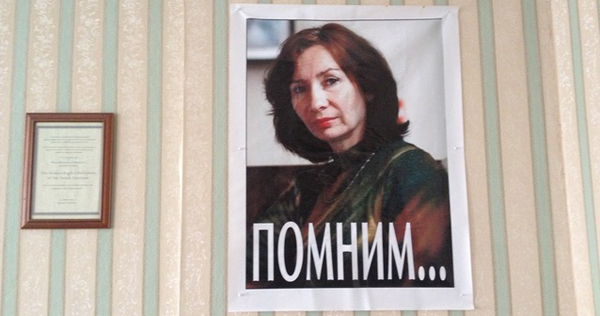European Court of Human Rights Rules: Russia Failed to Properly Investigate Natalia Estemirova’s Death

On 31 August 2021, the European Court of Human Rights issued a long-awaited judgement in the case of Chechen human rights defender Natalia Estemirova who was murdered in July 2009. The Court ruled that the Russian Federation violated the European Convention on Human Rights by failing to carry out an effective investigation into her murder.
Natalia Estemirova played a crucial role in combating impunity in Chechnya, which experienced two devastating wars in 1994 – 1996 and 1999 – 2009. As a staff member at Memorial Human Rights Centre, Estemirova investigated and documented cases of enforced disappearances, torture, extrajudicial killings, and other grave rights abuses in Russia’s republic of Chechnya. Renowned Russian journalist Anna Politkovskaya based her reporting on Estemirova’s research and documentation. Chechnya’s president, Ramzan Kadyrov, directly threatened Estemirova for her human rights work. On 15 July 2009, armed men kidnapped Natalia Estemirova near her home in Grozny, drove her to neighbouring, Ingushetia, where her body was discovered.
In this week’s Court decision, the Court, regrettably, did not conclude that the responsibility of the Russian state for the murder was established beyond reasonable doubt, the required standard of proof adopted by the Court. This means that state agents’ involvement in the murder was not established by the Court.
Human rights defenders and journalists have pointed to the failings and instances of falsification in the investigation of Estemirova’s murder. Memorial and the investigative newspaper Novaya Gazeta presented substantiated arguments that the main track of the official investigation – Natalia’s murder by a militant – does not hold. The investigative agencies and the court system of the Russian Federation have systematically denied the victim, Svetlana Estemirova (Natalia’s sister), and her legal representatives the right to review the materials in the case file. Of at least 95 volumes of the casework, the sister’s lawyer was allowed to read only nine and only then under a non-disclosure agreement.
Memorial and Novaya Gazeta argue that the responsibility for Natalia’s murder lies on the Chechen security forces. One of the main arguments supporting this version is the fact that Natalia received numerous threats to her life, including directly from Ramzan Kadyrov. These threats were connected to her human rights work. Unfortunately, the European Court did not evaluate these threats in its judgement.
As Lana Estemirova, Natalia’s daughter who was 15 at the time of the murder, said in an interview on the Russian independent TV channel Dozhd: “For my mom and for me the European Court of Human Rights has always been the last refuge of justice, […] therefore when you receive the verdict where it says written black on white that the Russian authorities are not responsible for mom’s murder it is of course very bitter”.
Natalia Estemirova remains a powerful symbol of the human rights movement in Chechnya and justice for her is crucial. Civil Rights Defenders renews its demand for justice and calls on the Russian authorities to ensure that those responsible for her murder are prosecuted and sentenced for their crime.
Natalia Estemirova’s activities documenting the ongoing abuse and abduction of civilians by government backed militias, inspired Civil Rights Defenders’ quest for a safety device that could enhance the protection of human rights defenders working in some of the most repressive and dangerous regions. In April 2013, the Natalia Project was launched as the world’s first security alarm system for human rights defenders at risk, powered by social media. Named in her honour, the project is still ongoing and counts upwards of 160 users worldwide, with more human rights defenders getting the Natalia Project bracelet and security training, every year.


